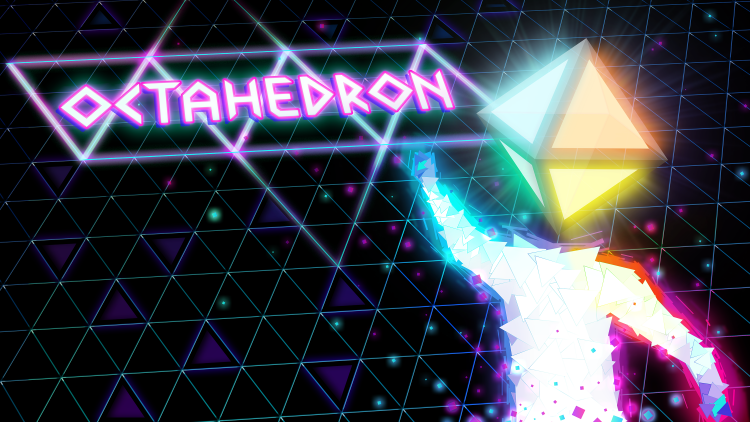A lonely cabin sits in a gnarled, silent forest, lit only by a fire from the inside. When the fireplace inevitably runs out of fuel, the cabin’s resident is forced to leave their safe location and venture into the outside, planning to return quickly.
OCTAHEDRON begins with this grim scene, cast entirely in grayscale. Players coming from a background with horror film might recognize the grainy quality of the film and familiar stakes, and they know what happens next: The protagonist is about to meet with some ghastly fate. This time, that fate will turn them into a neon polyhedral-headed figure, and put them in the midst of a vertical maze.
OCTAHEDRON, published by the Square Enix Collective, calls upon the faculties and skills of classic two-dimensional platforming skills, and puts them to the test in a new arena, called Veetragoul. The objective: Climb as high as possible to reach the next stage. Players have their skills of movement and jumping at their disposal, alongside the ability to create a physical platform beneath their feet, and move it at their whim. These platforms are temporary, lasting only a few seconds, but even one of those seconds could mean the difference between success and catastrophic failure. Precision in all areas is the only thing that will save the player from losing all their hard work in an instant.
The game is entirely wordless: Players receive no written or verbal instruction of any kind, during the intro or during gameplay. In an age when most games provide guidance in the form of “help” or “hint” buttons, this may seem out of place: Without directions, how will players know what to do?
This method of throwing players into gameplay headfirst hearkens back to an earlier age in gaming. Classic games like Nintendo’s “Super Mario Bros” were designed to use the act of playing the game to teach them about playing. In order to begin the game, they were required to move to the right, and from there they learned to jump, hit question mark blocks, and go through pipes.
Similarly, OCTAHEDRON players are introduced to platform-creation within the first few seconds of gameplay, and then immediately apply it. They learn in their first stage how to jump from point to point, recover their platform power and jump again. By the time they reach the first gate, they understand the game’s most basic controls.
Although their colorful nature might make them appear to be simply showy, the visuals are an equally critical tool. Players learn early on that smooth, technicolor rectangles are safe, but red lines with jagged edges spell disaster. Glowing, regular shapes are extra points, and anything with three dimensions is a collectable enhancement to the protagonist’s octahedral head. Flat-colored creatures with spindly legs are out for blood, and should be avoided at all costs, but the glowing platforms players create can block their movements and jumps.
But what makes OCTAHEDRON stand out from all the rest is something different: its sound. Demimonde, the studio that created the game, worked with musicians such as Chipzel, Andre Sobata, and Derek Howell, using trance music to tell a story. Developer Monomirror brings his background in trance music into the spotlight, designing a game that seamlessly integrates that soundtrack with gameplay. The soundscape they created provides tension without forcing the game to sacrifice player exploration. If you use a little imagination and pay attention, you can see when the light and color patterns sync up to the music behind them.
This deep sound design even goes beyond a base soundtrack. Players are rewarded with pleasant, interesting sounds when they collect power-ups or move platforms, and experience harsh, angry sounds when their avatar is damaged. These mechanics teach players that breaking fragile hanging lightbulbs is a good idea, contrary to what they might think at first, and allow them to clearly identify what will harm them and what won’t.
All of these tools allow OCTAHEDRON to speak to players in a universal language. By not relying on written or spoken word, the game is opened up to a whole world of players, giving it the potential to spread far and wide. This, coupled with its unique approach to platforming, is sure to make it appeal to many players, and provide them with hours of fun and engaging gameplay.
OCTAHEDRON released today, Tuesday, March 20th, and it is available on PlayStation4, XBox One, and PC.


